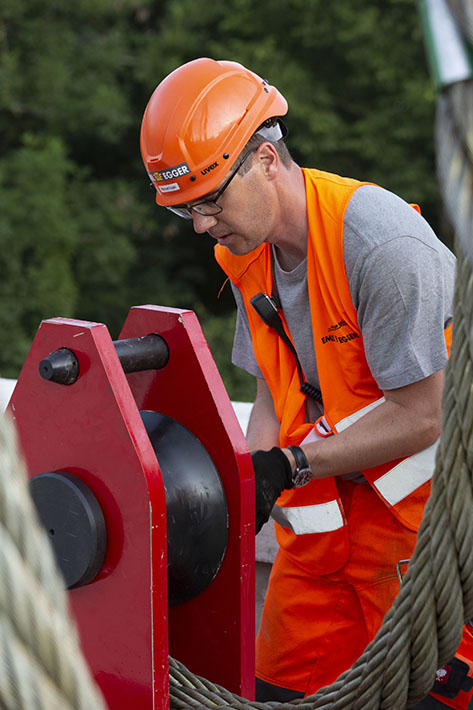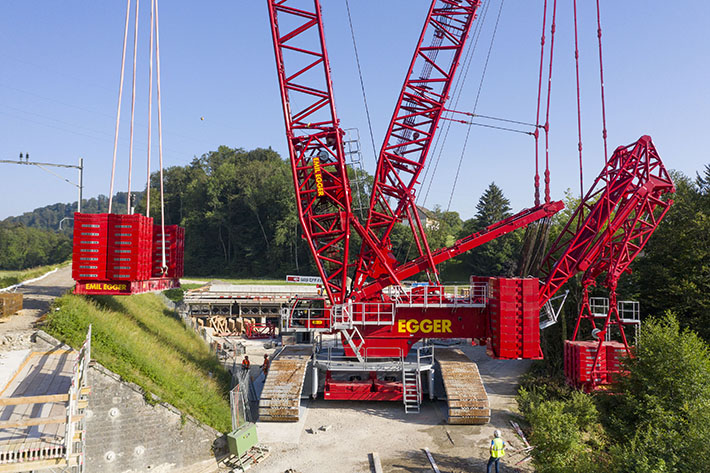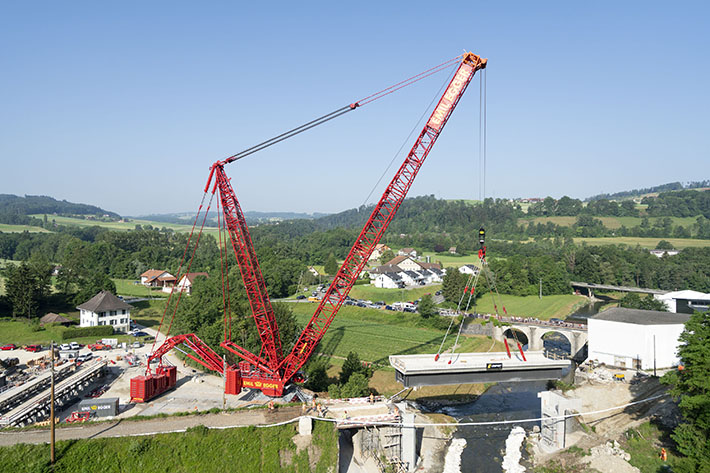- New feature for Liebherr crawler cranes proves an instant success
- First hydraulic folding frame for LR 11000 operated by Emil Egger AG
- V-frame and VarioTray make bridge hoist possible despite a lack of space
A Liebherr LR 11000 crawler crane featuring the innovative, highly flexible “V-frame” ballasting system has successfully completed its first jobs in the field. The 1000-tonne crane operated by Swiss crane logistics contractor Emil Egger AG used this hydraulically adjustable folding frame for the suspended ballast to complete a spectacular bridge hoist near Lausanne and also removed an old fire ship from the River Rhine in Basel. If the V-frame had not been used, these two crane jobs would only have been possible at significantly higher cost.
The bridge site at Moudon in western Switzerland featured everything that could make a crane job more difficult – extremely restricted space, protected trees and a heavy bridge which had to be positioned over a river with a 180 degree slewing process by the crane with a large radius and therefore also a large suspended ballast radius. The demanding requirements on site therefore created perfect conditions for a stiff practical test for the first use of the new V-frame on the LR 11000 operated by Emil Egger AG. “Without the hydraulically adjustable ballast radius, hoisting the bridge would have been significantly more expensive,” is how Managing Director and crane enthusiast Michael Egger explains the solution he provided for this job. “Firstly, it would have required much more expensive work on the embankment to get closer to the abutments with a crawler crane. And then we would also have required a much longer crane track to complete the bridge immediately in front of the abutment.”

Variable ballast radius from 13 to 30 meters creates flexibility
However, the V-frame made this expensive additional work superfluous on this site. The new development from the Liebherr Plant in Ehingen made it possible to reduce the radius of the suspended ballast to just 13 metres once the 380 tonne load had been hoisted. As a result of this small radius, the ballast pallet could be carefully guided past a small row of protected trees during the slewing process. When the railway bridge was placed on its abutments at a radius of 38 metres, the hydraulic ballasting device pressed the 440 tonne derrick pallet at a distance of 28.5 metres. “Another benefit of using the V-frame for jobs,” continues Egger, “is that the derrick ballast pallet has a maximum ground pressure of 150 kilonewtons per square metre thanks to the integral load distributor plates. The ground pressure from a ballast trailer is at least three times higher and therefore often requires expensive work to prepare the ground.”
VarioTray® makes auxiliary crane for ballasting superfluous
Another clever feature on Egger’s crawler crane, namely the VarioTray detachable ballast system, ensured that the job on the bridge site in Moudon was completed quickly. The facility to simply unbolt the central section of the suspended ballast means that there is no need for a mobile crane to stack and destack the ballast slabs. “Because of the situation on the site, we would have needed a large crane for this job – we would have lost an enormous amount of time and required a great deal of space,” says Egger. “In most cases, our LR 11000 can position the derrick ballast pallet, or at least the outer section, itself since the central section of the ballast remains on the crane and therefore only around 300 to 350 tonnes have to be moved.”

Just a few weeks later, the V-frame was able to show its strengths yet again for hoisting a ship onto the banks of the River Rhine in Basel on the same crawler crane. The adjustable ballast system was used for this job because there were buildings and obstacles in the way of the derrick ballast during the slewing process. In addition to the LR 11000, Liebherr also supplies the V-frame for the LR 1800-1.0, the newest crawler crane development from Ehingen.
Source: Liebherr

